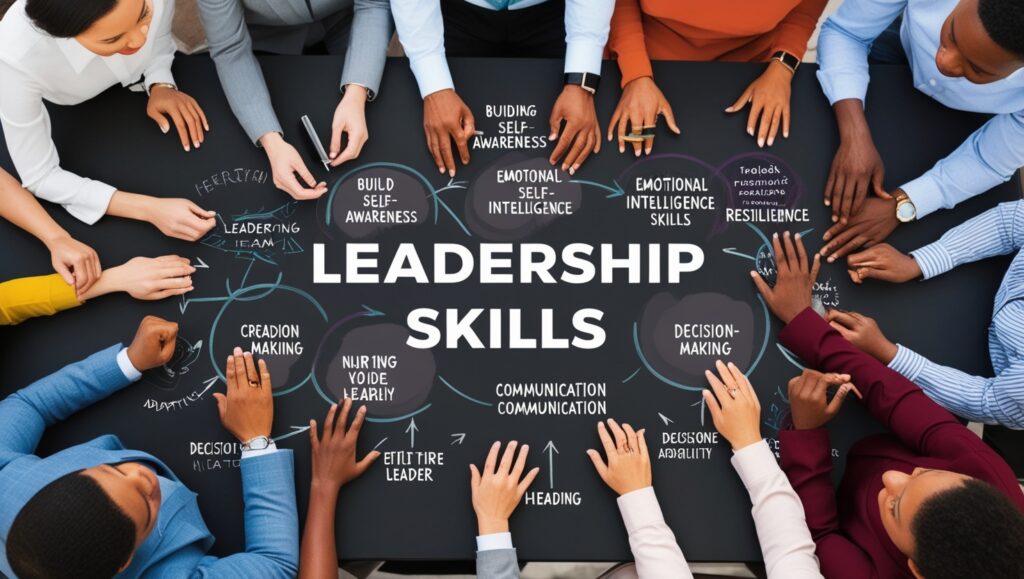Developing Leadership Skills
Leadership is a critical skill in both personal and professional contexts. Whether you’re managing a team at work, leading a community project, or aiming to inspire others in your personal life, becoming an effective leader takes time, effort, and the right mindset. Developing Leadership Skills Here’s a comprehensive guide to help you get started on developing leadership skills.
1. Understand What Leadership Means
Leadership isn’t just about being in charge; it’s about inspiring and guiding others toward a common goal. A great leader empowers their team, fosters collaboration, and remains committed to growth. Reflect on the qualities of leaders you admire and identify the traits you’d like to cultivate.
2. Start with Self-Awareness
Effective leadership begins with understanding yourself. Consider:
- Strengths and Weaknesses: Assess your core competencies and areas for improvement.
- Values and Vision: Define what you stand for and where you want to lead others.
- Emotional Intelligence: Practice empathy, self-regulation, and social skills to build stronger connections.
Take personality assessments like the Myers-Briggs Type Indicator (MBTI) or DISC to gain deeper insights into your leadership style.
3. Develop Communication Skills
Communication is the backbone of leadership. Learn to:
- Articulate Your Vision: Clearly convey your goals and inspire others to share your vision.
- Listen Actively: Show empathy by understanding others’ perspectives without judgment.
- Provide Constructive Feedback: Offer actionable insights while encouraging improvement.
4. Build Relationships and Networks
Leadership is a team sport. To lead effectively, focus on:
- Building Trust: Be honest, consistent, and reliable in your interactions.
- Mentoring and Being Mentored: Learn from experienced leaders while supporting others’ growth.
- Expanding Your Network: Engage with diverse individuals to gain new perspectives and opportunities.
5. Cultivate Problem-Solving and Decision-Making Skills
Great leaders face challenges with confidence. To sharpen your problem-solving skills:
- Stay Informed: Gather all necessary information before making decisions.
- Analyze Risks and Rewards: Weigh the potential outcomes of your actions.
- Remain Decisive: Take ownership of your decisions and learn from the results.
6. Learn to Delegate Effectively
Leadership isn’t about doing everything yourself. Empower your team by:
- Identifying Strengths: Assign tasks based on individual talents and interests.
- Trusting Others: Allow team members to take ownership of their roles.
- Providing Guidance: Be available to offer support when needed, but avoid micromanaging.
7. Embrace Continuous Learning
Leadership is a journey, not a destination. Stay committed to personal growth by:
- Taking Leadership Courses: Enroll in workshops or online programs to enhance your skills.
- Reading Leadership Books: Explore works by authors like Simon Sinek, Brené Brown, and John C. Maxwell.
- Seeking Feedback: Regularly ask for input from colleagues, mentors, and peers to identify blind spots.
8. Practice Resilience and Adaptability
Leadership often involves navigating uncertainty. Develop resilience by:
- Managing Stress: Practice mindfulness, exercise, or other stress-relief techniques.
- Adapting to Change: Stay flexible and open to new ideas and approaches.
- Learning from Failure: View mistakes as opportunities for growth rather than setbacks.
9. Take on Leadership Opportunities
Experience is the best teacher. Look for ways to lead in your current environment:
- Volunteer for Projects: Take charge of a team initiative or event.
- Join Community Organizations: Lead a local group or cause.
- Seek Leadership Roles at Work: Express your interest in managerial or mentorship positions.
10. Lead with Purpose
The most inspiring leaders have a clear sense of purpose. Align your actions with your values, and always strive to make a positive impact on the lives of others.
Final Thoughts
Leadership is an evolving skill that grows with practice and intention. By focusing on self-awareness, communication, problem-solving, and continuous learning, you can lay a strong foundation for your leadership journey. Developing Leadership Skills Start small, embrace challenges, and always lead with integrity—your growth as a leader will inspire others to do the same.

